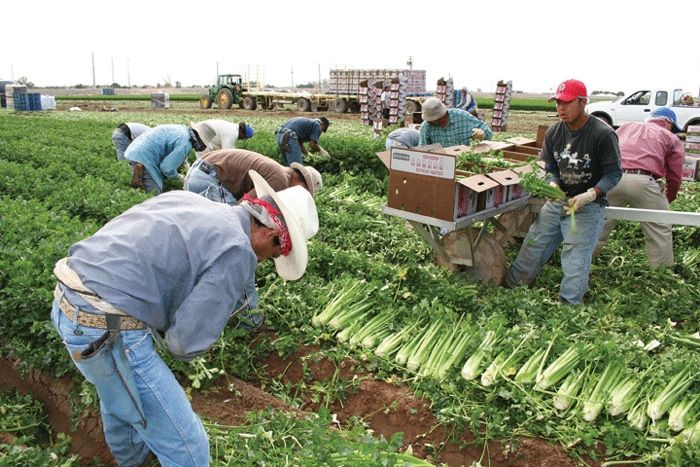
Immigration issues: ‘Much remains to be resolved’ by courts
• For United Fresh and the produce industry, immigration and related issues have been a long-time concern and interest, said Julie Maines, with the United Fresh Produce Association. Estimates vary, but you see consistently that well over half — even upwards of three-quarters — of the folks who work in the fields in the produce industry haven’t been born in this country.

Closely tied together,the U.S. produce industry and migrant work crews have both been closely following developments with state laws aimed at undocumented labor.
“For United Fresh and the produce industry, immigration and related issues have been a long-time concern and interest,” said Julie Maines, with the United Fresh Produce Association. “Estimates vary, but you see consistently that well over half — even upwards of three-quarters — of the folks who work in the fields in the produce industry haven’t been born in this country.
“So, certainly, anything related to immigration policy is of great interest to our industry.”
Despite the U.S. Supreme Court having ruled against much of Arizona’s controversial law regarding illegal workers (see http://southeastfarmpress.com/blog/more-confusion-clarification-supreme-court-s-immigration-ruling), Maines says much remains to be resolved. Among her comments:
The fallout of the Arizona laws versus those in the Southeast…
Georgia case
“Probably the most vivid case was the state of Georgia where they implemented mandatory E-Verify. Particularly last summer, when they were dealing with implementation of the law, there were a lot of problems with being able to keep an adequate work force in the field. Produce literally rotted in the field because there just weren’t enough workers to harvest it.”
“In the Southeast we have heard quite a bit from our members. This has been a real concern with significant ramifications in terms of their ability to get their products to market.”
Can E-Verify and H-2A be fixed or is an entirely new approach needed?
“What we’ve said while working at the state level and on Capitol Hill is that there needs to be a viable workable guest worker program. Whether or not H-2A can be fixed to address all the needs, would be a pretty tall order.
“H-2A does work for some of our members. But we’ve also had a lot of comments from other members that H-2A won’t allow them to get needed workers when they need them. So, fixing H-2A fully to meet everyone’s needs across the industry would be (difficult).”
The constantly-asked question: Why not just hire Americans?
“That’s one of the biggest areas where we’ve had to educate folks on Capitol Hill who don’t work in agriculture. … Basically, just hiring Americans isn’t that simple. We’ve found that repeatedly.
Too many examples to count
“Members have provided examples almost too many to count. They try — really try — to recruit local workers. Either no one applies or those who do start the job quickly, for whatever reason, don’t last long. Sometimes they’ll only last hours or a day, or two.”
The Supreme Court Arizona ruling and how it will affect the Southwest produce industry…
“It’s been interesting to see the fallout and analysis following the Arizona decision. You really see opinions all over the place. People are saying it’s a real victory for the federal government and (Obama) administration. Others say it’s really a victory for Arizona.
“I think the ramifications for the produce industry will largely come down to how it affects what Congress does next. Obviously, immigration policy is always a significant issue and we’re in an election year so the issue is even higher profile. People have intense feelings on any side of the issue.
“The fallout for the produce industry is still unfolding, evolving.”
The Senate farm bill’s approach to produce…
“We’re pretty pleased and appreciative of what the Senate did with respect to produce policy. They took a look at some of our key priorities like pest and disease management, block grants and research.
“We feel they did try to maintain the commitments and investments made in the 2008 farm bill, including trade and nutrition policy.
Tough environment
“It’s a tough budget environment, a tough political environment, a tough legislative environment. We’ll certainly be working with (lawmakers) in the House … to insure they’re aware of specialty crop policy priorities and the challenges the industry faces.”
The possibility of America importing a majority of its food if the labor situation isn’t worked out…
“It stands to reason to ask the question. If you can’t get folks to harvest and process … you have to wonder what ultimately will happen. It’s a valid question to consider…
“Field work is very hard and something we’ve had to work to clear up is that these jobs also require tremendous skill and experience. You can’t just put anyone in the field and have harvest be done correctly. To be efficient and effectively, you need workers who have the skills and experience.
“That’s something we’ve had to get across (in Congress) and other sectors. This isn’t simply a matter of having bodies show up.
“This isn’t going away and is an issue across agriculture, not just for produce. Even though everyone in this country is affected daily by agriculture and how well it’s doing, the education effort about the industry is constantly needed.
“Policymakers need to know about the needs and challenges of the industry from the inside because they’re sometimes unaware. (Farmers) shouldn’t be afraid to speak up.”
About the Author(s)
You May Also Like





